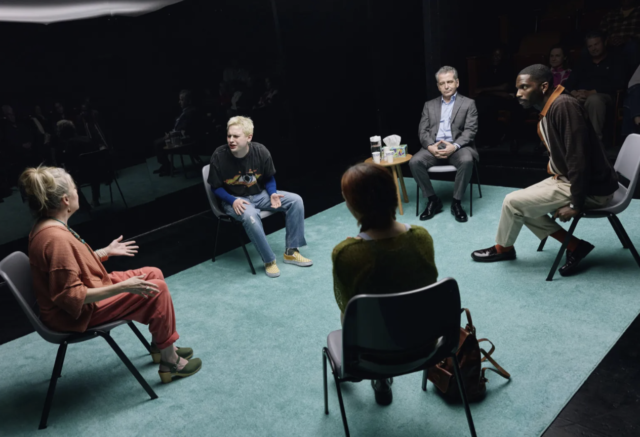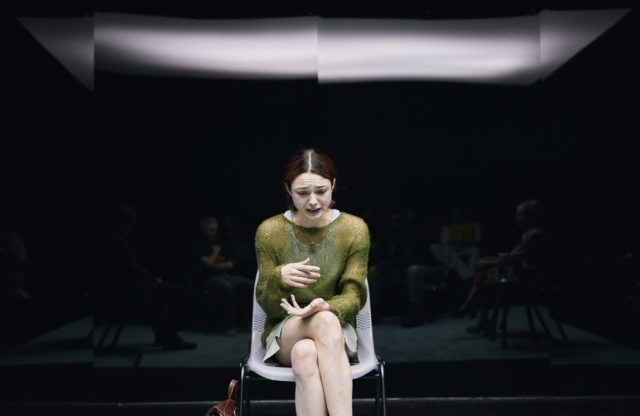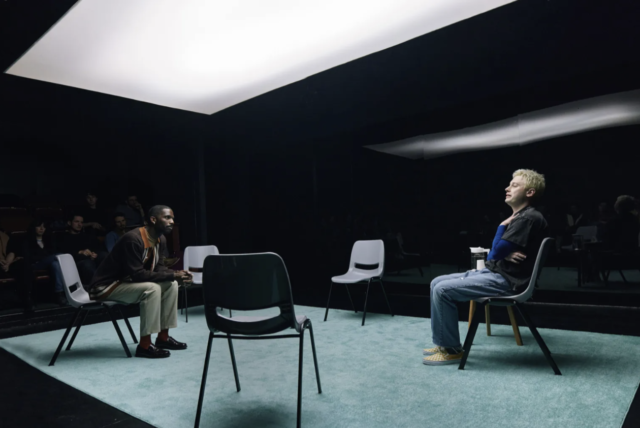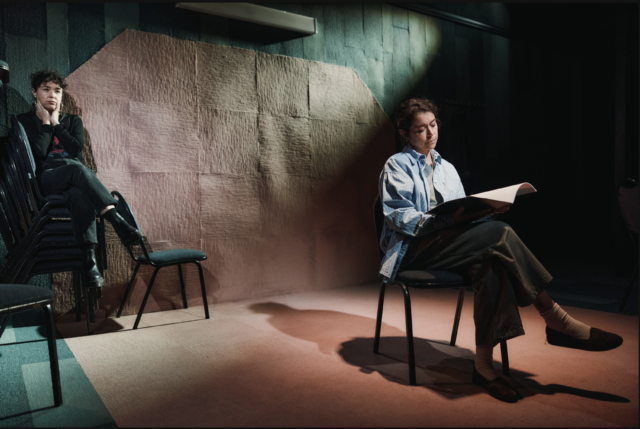
C (Sarah Steele) and A (Tatiana Maslany) discuss a difficult situation in Pre-Existing Condition (photo by Emilio Madrid)
PRE-EXISTING CONDITION
Connelly Theater Upstairs
220 East Fourth St. between Aves. A & B
Monday – Saturday through August 3, $49-$125
preexistingconditionplay.com
www.connellytheater.org
Don’t worry that the protagonist in Marin Ireland’s gripping and powerful major playwriting debut, Pre-Existing Condition, holds what appears to be a spiral-bound copy of the script throughout the play’s sleek and steady seventy-five minutes, sometimes glancing at the words, other times clutching it to her chest like Linus’s blanket in Peanuts. Known only as A, the character never lets go of the script, not because the actor has not yet learned all of the lines, but because it’s a constant reminder of a horrific, life-altering event in the character’s recent past. Over the show’s two-month run, A will be played by Emmy winner Tatiana Maslany (who I saw), Tony nominee and director Maria Dizzia, Tavi Gevinson, Tony winner Deirdre O’Connell, and Julia Chan — and each will hold that script.
It’s been seven months since A was brutally struck by her partner. No longer with the man, she speaks with an attorney, a psychiatrist, a few close friends, her parents, an old acquaintance, her parents, and others, but no one is able to help, instead only adding to her torment and confusion by subtly blaming her for first provoking the attack and then refusing to take her lover back.
She tries to date, but she’s clearly not ready, especially when the men she meets cannot, or will not, understand her situation. (All the men and A’s mother are played by Greg Keller, although I saw his understudy, Gregory Connors; the rest of the women are portrayed by Sarah Steele and Dael Orlandersmith.)
A finds some respite in group therapy run by two caring women who have developed a support program; during those sessions, the two facilitators talk directly to the audience, as if we are all part of this community, because when it comes down to it, we are; domestic violence can occur at any moment, in any family.
In one exchange with B, A questions her own responsibility.
B: do you still feel like it’s your fault?
A: yeah.
B: it’s not.
A: well.
B: you couldn’t have known.
A: but . . . couldn’t I? I mean, I’m not that stupid, right? I mean. I guess I’m realizing something kind of horrible about myself which is that I always thought that like women who got hit by their boyfriends were like . . . they were like . . .
B: (long pause) they were like what?
A: trash. They were like trash. (pause)
B: mmhm.
A: and the thing is that’s exactly what I felt like. Feel like. (pause) Trash. (pause) (pause) And there are days when I feel like maybe I always was trash and this experience just made me see that finally. Clearly. And it has really nothing to do with the, like, huge shame or guilt or any of that, anything even directly relating to this incident, it just starts to feel like a very very deep truth. That I’m trash. And I always was.
B: you believe that still? Right now at this moment?
A: Oh yeah yeah, of course. Sure. No, that hasn’t ever gone away since it started. It’s almost a peaceful thought, which I guess is what makes it feel like it must be true?
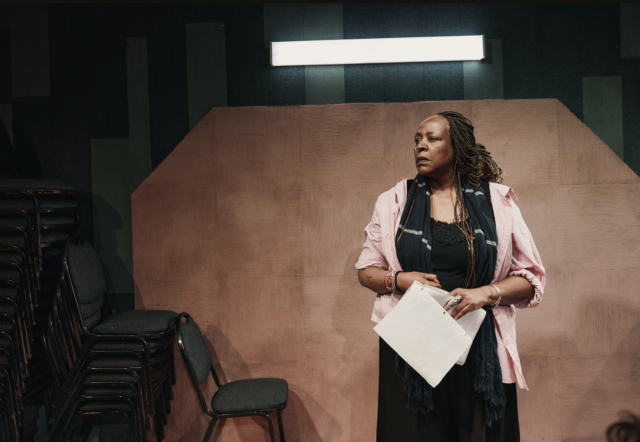
Dael Orlandersmith plays multiple roles in new play by Marin Ireland (photo by Emilio Madrid)
Later, A explores another aspect of her feelings that no one seems to get. “I’m so fucking exhausted by all of this. All of this. All of the taking it seriously and the. All of it,” she tells B. “I don’t — okay. I don’t want the big task of my life now to be ‘dealing with this.’ It’s fucking eating up everything.”
When a friend (C) mentions the possibility of her offering forgiveness, A states, “I don’t want to. Forgive. I don’t want to forget it. . . . I don’t want to also be guilty of forgetting it.”
As the healing process — whatever it encompasses — continues, the audience empathizes more and more with A, realizing that her pain and trauma could be anyone’s pain and trauma, that any one of us could be sitting in that chair in the middle of the room, being consumed by some type of tragedy.
The California-born, Obie-winning Ireland is one of New York’s finest actors, having appeared in such powerful plays as On the Exhale, Ironbound, Marie Antoinette, the intimate Uncle Vanya that took place in a Flatiron loft, and reasons to be pretty, which earned her a Tony nomination.
She was busy during the pandemic, acting in short virtual works for charity and conceiving “Lessons in Survival” at the Vineyard Theatre with Peter Mark Kendall, Tyler Thomas, and Reggie D. White, in which a company known as the Commissary reenacted historic speeches, interviews, and conversations by activists and artists from revolutionary times (including James Baldwin, Nina Simone, Angela Davis, Maya Angelou, Nikki Giovanni, Bobby Seale, and Muhammad Ali). Pre-Existing Condition is its own kind of lesson in survival, a deeply personal one.
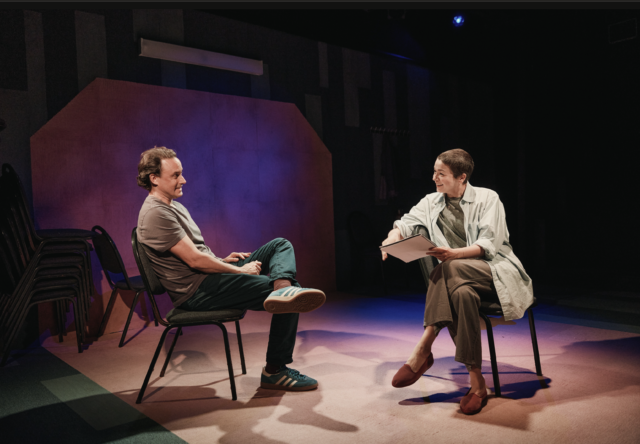
Julia Chan, seen here with Greg Keller, is one of five rotating actors portraying the protagonist in gripping play (photo by Emilio Madrid)
In 2012, Ireland and her boyfriend at the time, Scott Shepherd, were in London, starring as the leads in the Wooster Group’s Cry, Trojans!, an adaptation of Shakespeare’s Troilus & Cressida. One day she came to rehearsal with a black eye after Shepherd viciously hit her; he did not deny doing it. How Ireland was treated by the company and others following the event led her to lobby for systemic change in the theater.
“I continue to wonder where responsibility and accountability should be for what happened,” Ireland told the New York Times in 2015. “Many actors don’t know what to do when behavior — physical, sexual, harassment, bullying — crosses a line.”
Pre-Existing Condition is not a revenge drama, nor is it a self-help guide. It’s a brutally honest and provocative look at the psychological and bodily wounds that humans inflict and receive. Director Dizzia, an actor who has appeared in more than seventy movies and TV shows and theatrical productions, earning a Tony nomination for Best Performance by a Featured Actress for In the Next Room (or The Vibrator Play), allows Ireland’s story to unfold at a modest pace, luring the audience at the Connelly’s tiny upstairs theater into its many intricacies. Louisa Thompson’s spare set consists of a handful of chairs that match those the people in the first row sit in, implicating all of us; the actors switch chairs, but some are left empty, evoking ghosts who cannot be there. In the back are piles of more chairs, representing other survivors to come.
Drama Desk winner Steele (The Humans, I Can Get It for You Wholesale) is charming in multiple roles, wearing a Patti Smith T-shirt and jeans as she engages with A from multiple points of view. Solo specialist Orlandersmith (Spiritus/Virgil’s Dance, Forever) is wonderfully gentle as various therapists. Understudy Connors (The Poisoner, The Sign in Sidney Brustein’s Window), taking over this night for the always terrific Keller (Dig, Shhhh), is stalwart as the men in A’s life, the good and the bad.
Maslany (Grey House, Mary Page Marlowe) is sensational as the tormented A, searching for a way out of her lonely predicament. The Canadian actor’s expressive facial gestures and meticulous body movements, filled with uncomfortable pauses, are mesmerizing, daring us to try to find the way forward for A; in fact, it is not until the closing moments that Maslany makes any eye contact with the audience, bringing us further into her world, and concluding with an extraordinary coda.
A’s personal answers may not be in the pages she’s clinging to as if some kind of life line, but Ireland’s play does offer a fascinating blueprint of what we all should be paying a lot more attention to.
[Mark Rifkin is a Brooklyn-born, Manhattan-based writer and editor; you can follow him on Substack here.]
